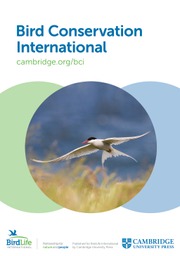Crossref Citations
This article has been cited by the following publications. This list is generated based on data provided by
Crossref.
Broom, Donald M.
2010.
Animal Welfare: An Aspect of Care, Sustainability, and Food Quality Required by the Public.
Journal of Veterinary Medical Education,
Vol. 37,
Issue. 1,
p.
83.
Lacher, Thomas
Bickham, "Jr
Gascon, Claude
Green, Rhys
Moore, Robin
and
Mora, Miguel
2010.
Wildlife Toxicology.
p.
111.
Fraser, D
and
MacRae, AM
2011.
Four types of activities that affect animals: implications for animal welfare science and animal ethics philosophy.
Animal Welfare,
Vol. 20,
Issue. 4,
p.
581.
Hille, Sabine M.
and
Collar, Nigel J.
2011.
Status assessment of raptors in Cape Verde confirms a major crisis for scavengers.
Oryx,
Vol. 45,
Issue. 2,
p.
217.
Gaston, Kevin J.
2011.
Common Ecology.
BioScience,
Vol. 61,
Issue. 5,
p.
354.
Cuthbert, Richard
Taggart, Mark A.
Prakash, Vibhu
Saini, Mohini
Swarup, Devendra
Upreti, Suchitra
Mateo, Rafael
Chakraborty, Soumya Sunder
Deori, Parag
Green, Rhys E.
and
Willis, Stephen G.
2011.
Effectiveness of Action in India to Reduce Exposure of Gyps Vultures to the Toxic Veterinary Drug Diclofenac.
PLoS ONE,
Vol. 6,
Issue. 5,
p.
e19069.
Eissen, Marco
and
Backhaus, Donata
2011.
Pharmaceuticals in the environment: an educational perspective.
Environmental Science and Pollution Research,
Vol. 18,
Issue. 9,
p.
1555.
Oaks, J. Lindsay
and
Watson, Richard T.
2011.
Wildlife Ecotoxicology.
Vol. 3,
Issue. ,
p.
413.
Oaks, J. Lindsay
and
Meteyer, Carol Uphoff
2012.
Fowler's Zoo and Wild Animal Medicine.
p.
349.
CHAUDHARY, ANAND
SUBEDI, TULSI RAM
GIRI, JEET BAHADUR
BARAL, HEM SAGAR
BIDARI, BASU
SUBEDI, HEM
CHAUDHARY, BADRI
CHAUDHARY, ISHWORI
PAUDEL, KHADANANDA
and
CUTHBERT, RICHARD J.
2012.
Population trends of Critically Endangered Gyps vultures in the lowlands of Nepal.
Bird Conservation International,
Vol. 22,
Issue. 3,
p.
270.
Ghorpade, Prabhakar B
Gupta, Praveen K
Prakash, Vibhu
Cuthbert, Richard J
Kulkarni, Mandar
Prakash, Nikita
Das, Asit
Sharma, Anil K
and
Saini, Mohini
2012.
Molecular sexing of threatened Gyps vultures: an important strategy for conservation breeding and ecological studies.
SpringerPlus,
Vol. 1,
Issue. 1,
Ogada, Darcy L.
Keesing, Felicia
and
Virani, Munir Z.
2012.
Dropping dead: causes and consequences of vulture population declines worldwide.
Annals of the New York Academy of Sciences,
Vol. 1249,
Issue. 1,
p.
57.
CHAUDHRY, M. JAMSHED I.
OGADA, DARCY L.
MALIK, RIFFAT N.
VIRANI, MUNIR Z.
and
GIOVANNI, MATTHEW D.
2012.
First evidence that populations of the critically endangered Long-billed Vulture Gyps indicus in Pakistan have increased following the ban of the toxic veterinary drug diclofenac in south Asia.
Bird Conservation International,
Vol. 22,
Issue. 4,
p.
389.
Cuklev, Filip
Fick, Jerker
Cvijovic, Marija
Kristiansson, Erik
Förlin, Lars
and
Larsson, D.G. Joakim
2012.
Does ketoprofen or diclofenac pose the lowest risk to fish?.
Journal of Hazardous Materials,
Vol. 229-230,
Issue. ,
p.
100.
Sharma, Pradeep
2012.
Aceclofenac as a Potential Threat to Critically Endangered Vultures in India: A Review.
Journal of Raptor Research,
Vol. 46,
Issue. 3,
p.
314.
Baral, N
Nagy, C
Crain, BJ
and
Gautam, R
2013.
Population viability analysis of Critically Endangered white-rumped vultures Gyps bengalensis.
Endangered Species Research,
Vol. 21,
Issue. 1,
p.
65.
Senyatso, Kabelo J.
Collar, Nigel J.
Dolman, Paul M.
and
Robertson, Mark
2013.
Assessing range‐wide conservation status change in an unmonitored widespread African bird species.
Diversity and Distributions,
Vol. 19,
Issue. 2,
p.
106.
Phipps, W. Louis
Wolter, Kerri
Michael, Michael D.
MacTavish, Lynne M.
Yarnell, Richard W.
and
Farwig, Nina
2013.
Do Power Lines and Protected Areas Present a Catch-22 Situation for Cape Vultures (Gyps coprotheres)?.
PLoS ONE,
Vol. 8,
Issue. 10,
p.
e76794.
Phipps, W. Louis
Willis, Stephen G.
Wolter, Kerri
Naidoo, Vinny
and
Farwig, Nina
2013.
Foraging Ranges of Immature African White-Backed Vultures (Gyps africanus) and Their Use of Protected Areas in Southern Africa.
PLoS ONE,
Vol. 8,
Issue. 1,
p.
e52813.
CLEMENTS, TOM
GILBERT, MARTIN
RAINEY, HUGO J.
CUTHBERT, RICHARD
EAMES, JONATHAN C.
BUNNAT, PECH
TEAK, SENG
CHANSOCHEAT, SONG
and
SETHA, TAN
2013.
Vultures in Cambodia: population, threats and conservation.
Bird Conservation International,
Vol. 23,
Issue. 1,
p.
7.




